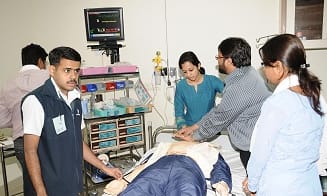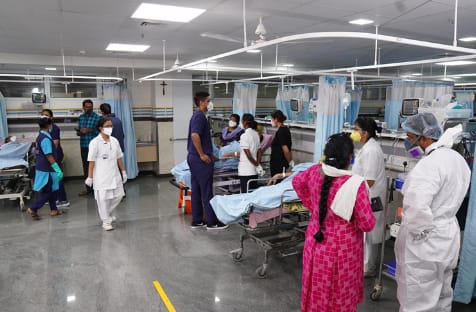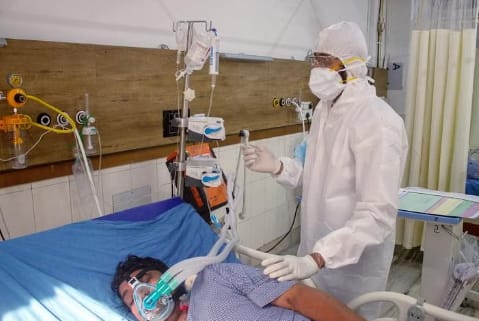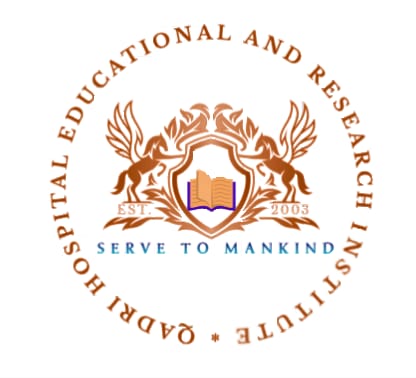Post Graduate Training in Emergency Medicine
Post Graduate Training in Emergency Medicine

Emergency Medicine (EM) is a vital specialty which provides an essential service for patients and communities and fulfils a unique and crucial remit within the national healthcare system. International Federation for Emergency Medicine defines Emergency Medicine (EM) as a field of practice based on the knowledge and skills required for the prevention, diagnosis and management of acute and urgent aspects of illness and injury affecting patients of all age groups with a full spectrum of undifferentiated physical and behavioral disorders. It further encompasses an understanding of the development of pre-hospital and in-hospital emergency medical systems and the skills necessary for this development.
Emergency Medicine is an inter-disciplinary specialty, one which is interdependent with all other clinical disciplines. The overarching aim of the Emergency Medicine Training Programme (EMTP) is to improve the safety and quality of care and reduce waiting times for patients in Emergency Departments (EDs). It encompasses a large amount of general medicine and surgery including the surgical sub-specialties. Some of the competencies identified for Emergency physicians are those required of a hospital specialist in any medical discipline whilst others are more specific to the practice of Emergency Medicine. Emergency Medicine has a unique field of action, both within the Emergency Department and in the community. The practice of Emergency Medicine includes the pre-hospital and inhospital reception, resuscitation and management of undifferentiated urgent and emergency cases until discharge from the Emergency Department or transfer to the care of another physician. It also includes involvement in the development of pre-hospital and in-hospital emergency medical systems. The emergency physician requires a broad field of knowledge and advanced procedural skills often including surgical procedures, trauma resuscitation, advanced cardiac life support and advanced airway management. Emergency Physicians are able to look after patients with a wide range of pathologies from the life-threatening to the self-limiting. They are experts in identifying the critically ill and injured, providing safe and effective immediate care. They are also expert in resuscitation and skilled in the practical procedures needed.


Programme Goals :
The qualities to be absolutely necessary:
- Sound knowledge and skills of the emergency aspects of medical and surgical speciality, and its application within the golden hour.
- Competent in life saving emergency interventions and appropriately use various diagnostic tests, and interpret their results intelligently & promptly.
- Possess humanistic qualities, attitudes and behaviour necessary for the development of appropriate patient-doctor relationship.
- To assist and if necessary train juniors.
- To keep up-to-date and be familiar with all recent advances in the field of Emergency medicine.
Programme Objectives :
1. Knowledge & Skills :
As a result of the training under this program, at the end of 2 years of postgraduate training, a resident must acquire the following knowledge, skills and competencies:
a) A thorough knowledge of pathological abnormalities, clinical manifestations, and principles of management of a large variety of medical and surgical emergencies of pediatrics, adults and geriatrics, affecting any organ system.
b) Skill and competence to choose and interpret correctly the results of the various routine investigations necessary for proper management of the patient. While ordering these investigations, a resident must be able to understand the sensitivity, specificity and the predictive value of the proposed investigation, as well as its cost effectiveness in the management of the patient.
c) Skill and competence in emergency interventions like endotracheal intubations, needle cricothyrotomy, tracheostomy, needle thoracocentesis, Intercostal drain placement, pericardiocentesis, defibrillation, mechanical ventilation, hemodialysis, ultrasonography, Echo so on and so forth.
d) Skills and competence to perform commonly used diagnostic procedures, namely, lumbar puncture, bone marrow aspiration/biopsy, liver/nerve/muscle/ skin/ kidney/ pleural biopsy, fine needle aspiration cytology of palpable lumps, pleural/pericardial/abdominal/joint fluid aspiration.
e) Skill and competence to choose and interpret correctly the results of specialized investigations including radiologic, ultra-sonographic, biochemical, hemodynamic, electro-cardio graphic, electrophysiological, pulmonary functional, hematological, immunological, nuclear isotope scanning and arterial blood gas analysis results.
f) Skill and competence to provide consultation to other medical and surgical specialties and sub-specialties, whenever needed.
g) Skill and competence to function effectively in varied clinical settings, namely emergency/critical care, ambulatory care, out-patient clinic, inpatient wards.
h) Skill and competence to take sound decisions regarding hospitalization, or timely referral to other consultants of various medical sub specialties recognizing his limitations in knowledge and skills in these areas.
i) Proficiency in selecting correct drug combinations for different clinical problems with thorough knowledge of their pharmacological effects, side effects, interactions with the other drugs, alteration of their metabolism in different clinical situations, including that in the elderly.
j) Skill and competence to advise on the preventive, restorative and rehabilitative aspects including those in the elderly, so as to be able to counsel the patient correctly after recovery from an acute or chronic illness.
k) Skill and competence to work cohesively in Resuscitation team along with paramedical personnel, maintain discipline and healthy interaction with the colleagues.
l) Skill and competence to communicate clearly and consciously, and teach other junior residents, medical students, nurses and other paramedical staff, the theory as well as the practical clinical skills required for the practice of Emergency Medicine
Clinical Rotational Posting :
The residents will rotate through both the emergency department and other clinical services. The residents will spend 7 months on the first year and in the second year will spend 8 months in the Emergency Department and of the remainder time rotating through other services. The rotations in the other departments will provide the residents with opportunities to develop important knowledge and skills in the core subjects. Expected rotations will be as follows:
Year I
Emergency Department: 7 months
Orthopedic & wound care: 2wks/2wks
Ophthalmology/ENT M: 1 month
ICU-1 month
CCU- 1 month
Anaesthesia-1 month
Year II
Emergency Department: 8 months
Trauma- 1 month
OBG/Psychiatry – 1 month
Radiology & Ultrasound- 2 wks
Administration (EM Services)-2 wks
Elective- 1 month
By the end of their first year, emergency medicine residents will:
1. Demonstrate the ability to provide appropriate care to patients with emergent and life threatening conditions:
a. Obtain an appropriately focused history and perform an appropriately focused physical examination
b. Develop comprehensive differential diagnoses
c. Develop an investigative and therapeutic plan
d. Develop and, after review, implement an appropriate written and verbal discharge plan
e. Demonstrate competency (including an understanding of the indications, contraindications, and techniques) in the core procedures used on patients with emergent and life-threatening conditions (eg, endotracheal intubation, tube thoracostomy, defibrillation/cardioversion, etc.)
2. Demonstrate a level-appropriate knowledge of the biochemical, clinical, epidemiologic, and social-behavioural basis of diseases seen in the emergency department:
a. Apply the principles of evidence-based medicine
b. Demonstrate mastery of the emergent and life-threatening conditions that present to the emergency department
c. Demonstrate a level-appropriate understanding of the core
3. Demonstrate the ability to appraise and assimilate scientific evidence and analyze and improve their own practice:
a. Demonstrate the ability to critically assess their competency in managing the emergent and life-threatening conditions that present to the emergency department
b. Use published studies to improve their own practice
c. Use available information technology appropriate to the care of their patients
4. Demonstrate a level-appropriate understanding of the role of the emergency department in the larger context of health care delivery:
a. Demonstrate the ability to divide his or her time and energies appropriately to provide optimal care for several patients concurrently
b. Develop plans for evaluation and treatment that, without compromising patient care, acknowledge the patient’s particular health care system
By the end of their second year, residents will, in addition to the objectives achieved during the first year:
1. Demonstrate the ability to provide appropriate care to patients
a. Listen to a history and physical examination presentation from a junior resident and provide appropriate feedback and guidance
b. Perform an appropriately focused history and physical examination, taking into consideration the previous evaluation of the junior resident
c. Implement an appropriate investigative and therapeutic plan
d. Implement an appropriate written and verbal discharge plan
e. Demonstrate understanding of the indications, contraindications, and techniques in uncommonly performed but lifesaving procedures (eg, cricothyroidotomy, burr craniotomy) and mastery of all other core procedures
f. Demonstrate an understanding of documentation as it applies to billing and reimbursement requirements
2. Demonstrate a level-appropriate knowledge of the biochemical, clinical, epidemiologic, and social-behavioural basis of diseases seen in the emergency department:
a. Demonstrate mastery of all conditions that commonly present to the emergency department
b. Teach courses such as ACLS as a certified instructor
c. Demonstrate an understanding of the core curriculum
3. Facilitate the learning of others
a. Teach and appropriately supervise medical students and junior residents
4. Demonstrate an understanding of the role of the emergency department in the larger context of health care delivery
a. Triage patients and direct the attention of junior-level residents so as to provide optimal care for all patients in the emergency department. Plan and participate in a mass-casualty disaster drill
Eligibility
- MBBS – 4 and ½ yr duration of course with 1 yr compulsory rotator internship. Recognized from Medical Council of India and permanent or provisional registration with any state medical council.
Selection Process:
Duration of the course:
Stipend
Deductions:
Lodging & Boarding:
Assessment of the Candidate:
Contact for application:
Interested candidates please send your CV to officeqheri@gmail.com with the necessary documents as mentioned below. At the time of application the trainee would have to produce:
1) A bonafide certificate from Dean of his / her institution where he / she has completed the MBBS training.
2) Photocopies of the certificate of the MBBS degree, and Certificate of registration with the appropriate State Medical Council or Medical Council Of India.
3) CV with 2 references. Must include tele contact / email id

